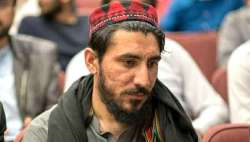Pakistan arrests Manzoor Pashteen, human rights leader who criticized army
Pakistani security forces on Monday arrested the leader of a human rights group that has accused the military of committing widespread abuses in its war on terror.

Pakistani security forces on Monday arrested the leader of a human rights group that has accused the military of committing widespread abuses in its war on terror.
Manzoor Pashteen was detained along with six others in a pre-dawn raid in the northwestern city of Peshawar, said Javed Khan, a local police official. He said Pashteen was arrested on charges of making anti-government speeches at rallies and inciting violence. He provided no further details.
Pashteen, 27, heads the Pashtun Protection Movement, which has emerged as a force among the country’s Pashtun minority, drawing tens of thousands to rallies. The group contends that the military is waging a campaign of intimidation as it battles Islamist militants in the country's rugged border region near Afghanistan. The group says the army's heavy-handed tactics include extrajudicial killings and thousands of disappearances and detentions.
Mohsin Dawar, a lawmaker who is also a member of the group, confirmed Pashteen's arrest. He told The Associated Press that police were taking Pashteen to Dera Ismail Khan, a town in the Khyber Pakhtunkhwa province bordering Afghanistan. He said Pashteen was apparently arrested on charges of attending anti-government rallies.
Pashteen’s supporters condemned his arrest on social media, while others praised the police action, saying a “traitor” had been arrested.
A prominent Pakistani rights leader Afrasiab Khattak criticized the arrest, saying it “exposes the colonial type repressive state policy against Pashtun in general,” as well as the people of the former tribal region of North Waziristan in particular.
Gulalai Ismail, a Pakistani human rights activist who recently fled the country to avoid harassment by security agencies, also denounced the arrest in a tweet. “We, Pashtuns, will remain non-violent in the face of the arrest of our movement's leader,” she said, adding that peaceful resistance is ”the major pillar"of the movement.
the military has used indiscriminate force as it hunts for Taliban hideouts in the tribal regions where the Pashtun dominate, imposing collective punishments like bulldozing the homes of family members of suspected militants and punishing entire villages for extremist attacks.
The catalyst for the group’s creation was the police killing in 2018 of Naqueebullah Mehsud, a 27-year-old ethnic Pashtun and aspiring model who was shot dead in the southern port city of Karachi. Many displaced Pashtuns have relocated there after being displaced by the military operations in the tribal regions.